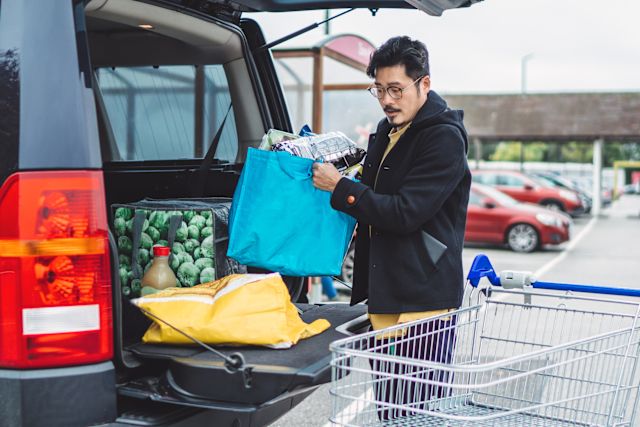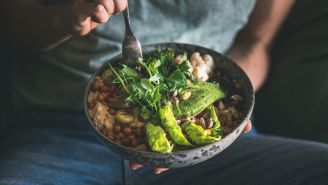Updated on December 3, 2024.
You may be trying to do your part to save the planet by using eco-friendly reusable grocery bags, rather than disposable plastic bags. But did you know that if you don't clean those reusable totes frequently and properly, you may be putting your family's health at risk?
It’s true—reusable bags can harbor nasty bugs that could contribute to food-borne illnesses, including salmonella, listeria, and E.coli. Here’s what to know about safely using them.
Reusable bags are growing in popularity
Reusable bags have become a common feature of American consumer life. As of early 2024, 14 states have enacted a ban on single-use plastic bags. Many more municipalities in various states have banned them, as well. Even in states where single-use bags are allowed, many people voluntarily choose to use reuseable bags. In fact, one survey found more than 38 percent of adults under age 30 use reusable bags.
Going green isn’t always clean
While the importance of regularly cleaning countertops, refrigerators, and coolers may be common sense to many people, cleaning reusable bags may not make the priority list. But it should. When foods spill, leak, or smear onto cloth grocery bags, it can create a breeding zone for harmful bacteria that can contaminate your food. Each year, about 48 million Americans contract food poisoning from contaminated foods.
How can your reusable grocery bags make your family sick? "The pathogens on meat and poultry are easily spread because many people, trying to be eco-friendly, don't use plastic bags for their vegetables," says Pat Kendall, PhD, RD, former associate dean for research at Colorado State University's College of Health and Human Sciences. "Those plastic bags in the produce section are there for sanitary reasons." Instead, veggies get thrown into the grocery cart, which harbors its own germs, then packed into a reusable grocery bag along with the meat and poultry.
It's not just a question of blood or other liquids leaking out of the meat or poultry packaging. "E.coli may live on the meat packaging itself, given the way it's handled when it's prepared and wrapped," Kendall says. The pathogens form a biofilm similar to that of your reusable grocery bag. A biofilm is a protective covering for a group of bacteria that can survive in a fairly arid climate.
Common food-borne bugs
Harmful food-borne bacteria affect the human body in a variety of unpleasant ways, and some bugs can be very dangerous for some people. A few of the most common include:
- Listeria monocytogenes, which may be found in raw meats. About 1,600 people are sick with a listeria infection each year.
- Escherichia coli (or E. coli), which may be found in any food or water contaminated with feces. About 265,000 cases occur in the U.S. each year.
- Salmonella, which may come from any uncooked foods that carry the bug. There are about 1.35 million infections caused by Salmonella each year in the U.S.
Food poisoning can cause stomach cramps, diarrhea, and vomiting, symptoms which are sometimes referred to collectively as gastroenteritis. They generally last from four to seven days. If a listeria infection affects the bloodstream, it can lead to meningitis, a life-threatening bacterial infection.
People with other serious medical conditions or who are receiving treatments that weaken their immune systems may be much more at risk of becoming ill from contaminated food. For example, people with cancer have 10 times the risk of a Listeria infection compared to people without cancer. And people undergoing dialysis have as much as 50 times the risk.
Clean tote techniques
How can you be eco-friendly and keep your groceries safe? For starters, use the plastic bags in the produce section to protect your fruits and veggies. Also put meat and poultry packages in plastic bags to contain any juices that might leak. Keep produce separate from meats and poultry in your grocery cart.
When you're checking out, have two totes handy: one for fruits and veggies and the other for uncooked meat and poultry. Labels can be helpful for remembering which is which. And be sure not to use food bags for non-food items, and vice versa.
The Academy of Nutrition and Dietetics and the American Cleaning Institute recommend these guidelines:
- Wash totes after each use, either in the washing machine or by hand with hot, soapy water. Nylon, polyester, or polypropylene are very common materials for bags, and they should be handwashed or washed on the gentle cycle, then line-dried. Cotton, bamboo, or hemp bags can be dried in a clothes dryer, though cotton bags may shrink.
- Any insulated bags should be wiped with disinfectants and a cloth, paying particular attention to the seams.
- Keep areas where you place the totes, such as kitchen counters, clean. To kill the bacteria on counters, spray the surface with an antimicrobial cleaner, such as a commercial cleanser or diluted bleach (1/2 teaspoon bleach in 1 quart water). Wipe the surface clean with a paper towel.
- After you wash totes, make sure they’re completely dry before storing them.
- Store totes in a clean, dry place, and avoid leaving empty totes in the trunk of your car. Trunks have a tendency to be dark, warm, and humid, making them friendly to bacteria growth.







